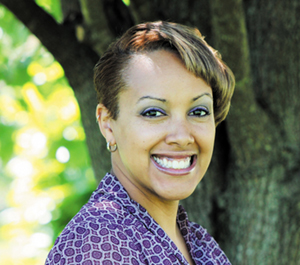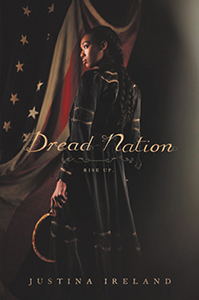2018 School Spending Survey Report
Publishers' Preview: Diverse Voices: Five Questions for Justina Ireland
This interview originally appeared in the May/June 2018 Horn Book Magazine as part of the Publishers’ Previews: Diverse Voices, an advertising supplement that allows participating publishers a chance to each highlight a book from its current list.

This interview originally appeared in the May/June 2018 Horn Book Magazine as part of the Publishers’ Previews: Diverse Voices, an advertising supplement that allows participating publishers a chance to each highlight a book from its current list. They choose the books; we ask the questions.
Sponsored by![]()
It’s a Dread Nation indeed when the Civil War ends because zombies rise from the fields of Gettysburg.
 Photo: Eric Ireland.
Photo: Eric Ireland.1. If you were in charge, who would play Jane and Katherine in the movie?
I’m terrible with names of actors, so let’s just say I’m rooting for everybody Black.
2. Wikipedia traces zombie lore back to Mesopotamia. Where did your interest begin?
Legends of the undead go back to ancient cultures, but our Western idea of the zombie, specifically, is tied to Haiti and to a racist and visceral response to the violent overthrow of slavery and white fear of freed Black people. I’m perhaps less interested in zombies than I am in the why of zombies. What do they say about our collective imagination? How can writers manipulate that to question our societal beliefs? Those bigger ruminations on the meaning of myth have plagued me since elementary school.
 3. Why do you think zombies have held on to our imaginations so durably?
3. Why do you think zombies have held on to our imaginations so durably?Zombies are a writer’s best friend. They’re a moldable metaphor that can represent everything from our lack of human connections to the dangers of capitalism to science run amok. They’re a catalyst, a device that moves the plot forward, adds tension, provokes great action sequences, saturates the world with dread. They are a ready, easy antagonist. That is, until the real antagonist is revealed.
4. Historical fiction, horror, Western, comedy, tragedy — how did you go about balancing all of those genre expectations?
When you’re talking about something like structural racism, you need to use as many lenses as possible to help readers engage with ideas that they maybe aren’t comfortable exploring. If I’d used just one — say, comedy — I would have run the risk of readers thinking the legacy of racism and inequality in this country was humorous. Using a few elements of each genre, I’ve hopefully created the perfect vehicle for folks to consider some pretty heavy issues.
5. Will we see Jane again?
You betcha.
Sponsored by![]()
RELATED
RECOMMENDED
ALREADY A SUBSCRIBER? LOG IN
We are currently offering this content for free. Sign up now to activate your personal profile, where you can save articles for future viewing.






Add Comment :-
Be the first reader to comment.
Comment Policy:
Comment should not be empty !!!